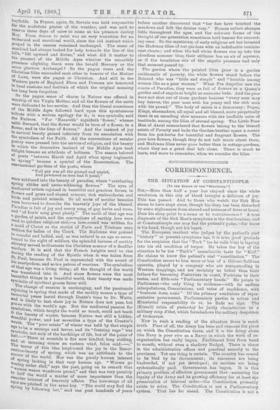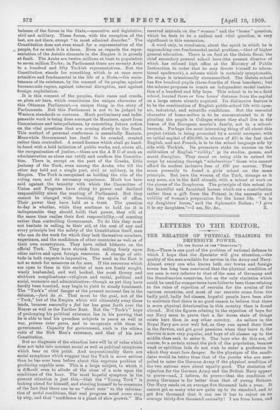CORRESPONDENCE.
THE SITUATION AT CONSTANTINOPLE.
[To THI EDITOR Or VIZ EPROTATOR."1 Sin,—More than half a year has elapsed since the white revolution in this city of blood brought a delirium of joy. This has passed. And to those who watch, the Sick Man seems to have slept since, though his sleep has been disturbed by sonic nightmares from abroad and accesses of fever at home. Does his sleep point to a coma or to convalescence ? A true diagnosis of the Sick Man's symptoms is the desideratum, and at Constantinople one may feel the patient's pulse,—for there is his hand, though not his heart. The European resident who judges by the patient's past
"
history" or present symptoms has, it is true, good grounds for the suspicion that the "Turk "(as he calls him) is lapsing into his old condition of torpor. He takes the key of the situation to be the "Turk's" ineradicable taste for " Kelf." He claims to know the patient's real "constitution." The Constitution seems to him more or less of a Gilbert-Sullivan operetta, played by a company who are masquerading in Western trappings, and are certainly no better than their fathers for becoming Positivists in creed, Parisians in their tastes, and fifth-rate "Parliamentary hands." He points to Parliament—the only thing in evidence—with its endless interpellations, Commissions, and votes of confidence, with "business done, none." Of the primary conditions of repre- sentative government, Parliamentary parties in action and Ministerial responsibility in re, he finds no sign. The (Kianail) crisis of yesterday he justly characterises as a military coup cretat, which foreshadows the military despotism of to-morrow. Now in such a reading of the situation there is much truth. First of all, the Army has been and remains the pivot on which the Constitution turns, and it is the Army alone (the Navy is pour rive as a Navy) in which the work of re- organisation has really begun. Parliament lives from band to mouth, without even a shadowy Budget. There is chaos in the administrative offices and practical anarchy in the provinces. Yet one thing is certain. The country has ceased to be bled by its Government; its resources are being husbanded, if not yet developed; its services are being systematically paid. Government has begun. It is this primary problem of effective government that—assuming the loyalty of the Army and its growing efficiency for at least the preservation of internal order—the Constitution primarily exists to solve. The Constitution is not a Parliamentary system. That lies far ahead. The Constitution is not a
balance of the forces in the State,—executive and legislative, civil and military. These forces, with the exception of the last, are not there, except "in most admired disorder." The Constitution does not even stand for a representation of the - people, for as such it is a farce. Even as regards the repre- sentation of the Asiatic elements in the Empire it is grossly at fault. The Arabs are twelve millions at least in population to seven million Turks; in Parliament there are seventy Arab to a hundred and fifty Turkish representatives. But the Constitution stands for something which is at once more primitive and fundamental in the life of a State,—the main- tenance of its existence, by the consent of its peoples, against bureaucratic rapine, against internal disruption, and against foreign exploitation.
It is this consent of the peoples, their races and creeds, en plein air here, which constitutes the unique character of this Ottoman Parliament,—a unique thing in the story of Parliaments. But this Parliament is not to be judged by Western standards or customs. Much preliminary and indis- pensable work is being done amongst its Members, apart from Commissions and interpellations, by concerting future action on the vital questions that are coming slowly to the front. This method of personal conference is essentially Eastern. Meanwhile Government has itself to be created, created rather than controlled. A sound finance which shall go hand- in-hand with a bold initiation of public works, and, above all, the reorganisation of justice,—these are the A B C of such an administration as alone can ratify and confirm the Constitu- tion. There is, except on the part of the Greeks, little jealousy of the Turk, even among the Arabs, who till the other day held. not a single post, civil or military, in the Empire. The Turk is recognised as holding the role of the ruling race, and its necessary experience. Much has been said against the tenacity with which the Committee of Union and Progress have clung to power and declined responsibility since the meeting of Parliament. But they cannot be charged with touching the spoils of office. Their power they have held as a, trust. The question to-day is whether, while they continue to hold (as it is indispensable they should hold) that power, they will at the same time realise their first responsibility,—of creating rather than controlling Government. To do this they must not hesitate in calling to their aid, at the cost of any and every principle but the safety of the Constitution itself, men who can do the work for which they lack themselves numbere, experience, and the confidence of other countries as well as of their own countrymen. They have relied hitherto on the official Turk. They have shrunk from calling freely upon other native and upon foreign resources. A change of atti- tude in both respects is imperative. The need in the East is not so much for measures as for men. If the resources which are open to them in this matter of men are freely sought, wisely husbanded, and well backed, the most thorny and stubborn complications—religious and racial, political and social, economic and administrative—though as yet they have hardly been touched, may begin to yield to steady treatment. The," Turk's " chief danger at the present moment lies in the delusion,—fara da se. That must be the goal, not of the " Turk," but of the Empire which will ultimately sway these lands, because assuredly a fiat Zuz has gone forth over the Nearer as well as the Farther East. But the "Turk's" hope of prolonging his political existence lies in his proving that be is able to lend his quondam subjects in peace as well as war, primus inter pares, and to co-operate with them in government. Capacity for government, such is the ultimo ratio of the Sick Man's existence, and that of his new Constitution.
But no diagnosis of the situation here will be of value which does not take into account social as well as political symptoms which bear on this point. And unquestionably there are social symptoms which suggest that the Turk is more serious than he has ever been before about this supreme problem of producing capable men. This is a large subject, to which it is difficult even to allude at the close of a note upon the conditions of the hour. The most hopeful symptom in the present situation is just this,—that the "Young Turk " is looking ahead for himself, and showing himself to be conscious of the fact that there can be no "abort cuts" to the reforma- tion of social conditions, that real progress must come step by step, and that "confidence ii a plant of slow growth." His reserved attitude on the "woman ". and the " home " question, which he feels to be a radical and vital question, is very significant in this connexion.
A word only, in conclusion, about the spirit in which he is approaching one.fundamental social problem,—that of higher general education. There is on foot at the Galata Serai, the chief secondary general school here (the present director of which has refused high office at the Ministry of Publics Instruction in order that he may devote himself to educa- tional spadework), a scheme which is certainly symptomatic. Its scope is intentionally circumscribed. The Galata school has five hundred pupils (three-fourths of them boarders); but the scheme proposes to create an independent model institu- tion of a hundred and fifty boys. This school is to be a field school, located three or four hours' distance from the capital on a large estate already acquired. Its distinctive feature is to be the combination of English public-school life with open- air, industrial, and scientific conditions. But the essential character of home-milieu is to be communicated to it by planting the pupils in Colleges where they shall live in the bosom of the European master's family, not in a school- barrack. Perhaps the most interesting thing of all about this project (which is being promoted by a soei6te anonyme, with an initial capital of 250,000, in shares of 25) is the fact that English, and not French, is to be the school language side by side with Turkish. Its promoters stake its success on the cultivation of English "virility," in its studies, games, and moral discipline. They count on being able to extend its scope by assisting through "scholarships" those who cannot afford its modest inclusive fees of 280 per annum. They mean presently to found a girls' school on the same principle. But here the women of the Turk, strange as it may seem, are in the field already, with a school at work on the shores of the Bosphorus. The principle of this school (in the beautiful and furnished houses which are a contribution rather than a gift from the Palace) is the necessity and nobility of woman's preparation for the home life. "It is my daughters' house," said the diplomatic Sultan; "I give it to my daughters."—I am, Sir, &a., Z.







































 Previous page
Previous page